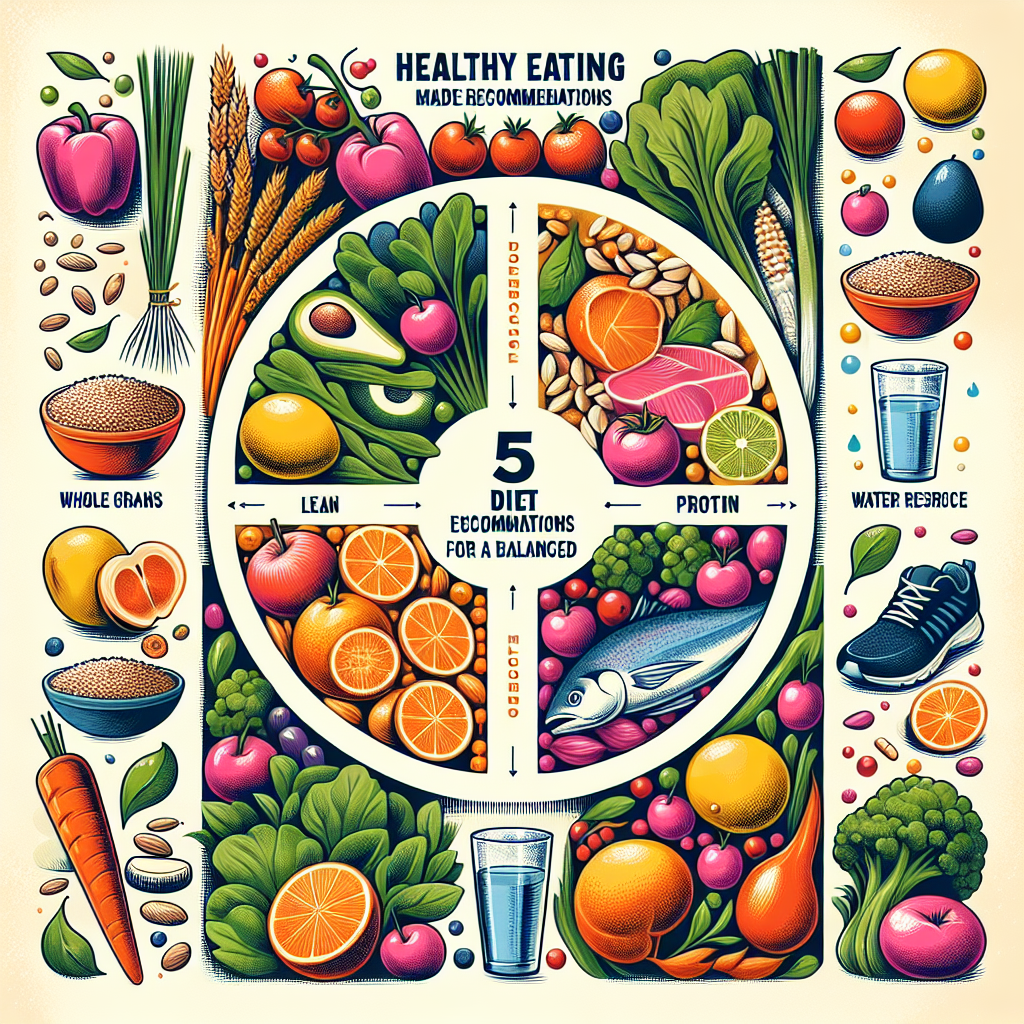Healthy Eating Made Easy: 5 Diet Recommendations for a Balanced Lifestyle

Healthy eating is essential for maintaining optimal health and well-being. It provides the body with the necessary nutrients, vitamins, and minerals it needs to function properly. A balanced diet that includes a variety of foods from all food groups is key to ensuring that you are getting all the nutrients your body needs. In this article, we will explore the basics of healthy eating, including the importance of macronutrients, vitamins, and minerals. We will also discuss the benefits of incorporating more fruits and vegetables, lean protein sources, whole grains, and healthy fats into your diet. Additionally, we will address the dangers of processed foods and added sugars, the importance of portion control and mindful eating for weight management, the benefits of hydration, meal planning and preparation tips for healthy eating on-the-go, and making sustainable lifestyle changes for long-term health and wellness.
Key Takeaways
- Healthy eating involves understanding the basics of nutrition
- Fruits and vegetables should make up a significant portion of your diet
- Lean protein sources are important for optimal health
- Whole grains and complex carbohydrates provide essential nutrients
- Healthy fats play a role in a balanced diet
- Processed foods and added sugars can be harmful to your health
- Portion control and mindful eating can aid in weight management
- Drinking enough water is crucial for hydration and overall health
- Meal planning and preparation can help maintain healthy eating habits on-the-go
- Sustainable lifestyle changes are key for long-term health and wellness
Understanding the basics of healthy eating
A balanced diet consists of macronutrients (carbohydrates, proteins, and fats) as well as vitamins and minerals. Macronutrients provide energy to the body and are needed in larger quantities compared to micronutrients (vitamins and minerals). Carbohydrates are the body’s main source of energy and should make up about 45-65% of your daily calorie intake. They can be found in foods such as grains, fruits, vegetables, and legumes. Proteins are essential for building and repairing tissues in the body. They can be found in foods such as meat, poultry, fish, dairy products, legumes, and nuts. Fats are important for providing energy, insulating organs, and helping with nutrient absorption. They can be found in foods such as oils, nuts, seeds, avocados, and fatty fish.
Vitamins and minerals are essential for various bodily functions such as immune system support, bone health, and energy production. They can be found in a wide range of foods, including fruits, vegetables, whole grains, lean proteins, and dairy products. It is important to consume a variety of foods from different food groups to ensure that you are getting all the necessary vitamins and minerals.
Incorporating more fruits and vegetables into your diet
Fruits and vegetables are packed with essential vitamins, minerals, and fiber. They are low in calories and high in nutrients, making them an excellent addition to a healthy diet. Eating a variety of fruits and vegetables can help reduce the risk of chronic diseases such as heart disease, stroke, and certain types of cancer. They also provide antioxidants that help protect the body against damage from free radicals.
To incorporate more fruits and vegetables into your diet, try adding them to every meal. Include a side of vegetables with your lunch and dinner, and add fruits to your breakfast or as a snack throughout the day. You can also experiment with different cooking methods such as roasting or grilling vegetables to enhance their flavor. Additionally, consider trying new fruits and vegetables that you haven’t had before to keep things interesting.
Choosing lean protein sources for optimal health
| Protein Source | Protein Content (per 100g) | Fat Content (per 100g) | Calories (per 100g) |
|---|---|---|---|
| Chicken Breast | 31g | 3.6g | 165 |
| Tuna | 30g | 0.8g | 132 |
| Salmon | 25g | 13g | 208 |
| Black Beans | 21g | 0.9g | 114 |
| Quinoa | 4.4g | 1.9g | 120 |
Protein is an essential macronutrient that plays a crucial role in building and repairing tissues in the body. It is also important for the production of enzymes, hormones, and antibodies. When choosing protein sources, it is important to opt for lean options that are low in saturated fat and cholesterol.
Lean protein sources include skinless poultry, fish, legumes (such as beans and lentils), tofu, tempeh, and low-fat dairy products. These options provide high-quality protein without the added unhealthy fats. Incorporating lean protein sources into your diet can help promote muscle growth and repair, support weight management, and provide a feeling of fullness.
The importance of whole grains and complex carbohydrates
Whole grains are an important part of a healthy diet as they provide essential nutrients such as fiber, B vitamins, and minerals. Unlike refined grains, which have been stripped of their bran and germ, whole grains contain all parts of the grain, making them a more nutritious choice. Complex carbohydrates, which are found in whole grains, provide a slow and steady release of energy, helping to keep you full and satisfied for longer periods.
Incorporating whole grains into your diet can be as simple as swapping refined grains for whole grain options. Choose whole wheat bread instead of white bread, brown rice instead of white rice, and whole grain pasta instead of regular pasta. You can also experiment with different types of whole grains such as quinoa, barley, and bulgur.
Healthy fats and their role in a balanced diet

Contrary to popular belief, not all fats are bad for you. In fact, healthy fats are an essential part of a balanced diet and provide numerous health benefits. Healthy fats help support brain function, protect organs, promote healthy skin and hair, and aid in the absorption of fat-soluble vitamins.
There are different types of fats: saturated fats, trans fats, monounsaturated fats, and polyunsaturated fats. Saturated fats and trans fats should be limited as they can increase the risk of heart disease. These fats are found in foods such as red meat, full-fat dairy products, fried foods, and processed snacks.
On the other hand, monounsaturated fats and polyunsaturated fats are considered healthy fats. They can be found in foods such as avocados, nuts, seeds, olive oil, and fatty fish like salmon and mackerel. These fats can help reduce bad cholesterol levels and lower the risk of heart disease when consumed in moderation.
The dangers of processed foods and added sugars
Processed foods are often high in unhealthy fats, added sugars, sodium, and artificial additives. Consuming these foods regularly can lead to weight gain, increased risk of chronic diseases, and poor overall health. Added sugars, in particular, can contribute to weight gain, tooth decay, and an increased risk of developing conditions such as type 2 diabetes and heart disease.
To reduce your intake of processed foods and added sugars, opt for whole, unprocessed foods whenever possible. Cook meals at home using fresh ingredients and limit your consumption of packaged snacks, sugary beverages, and desserts. When reading food labels, look out for hidden sources of added sugars such as high fructose corn syrup, cane sugar, and maltose.
Portion control and mindful eating for weight management
Portion control is an important aspect of maintaining a healthy weight. It involves being mindful of the amount of food you consume and listening to your body’s hunger and fullness cues. Mindful eating, on the other hand, involves paying attention to the taste, texture, and smell of food while eating slowly and without distractions.
To practice portion control, start by using smaller plates and bowls to help control portion sizes. Be mindful of portion sizes when eating out or ordering takeout by sharing meals or asking for half portions. Additionally, listen to your body’s hunger and fullness cues. Eat when you are hungry and stop eating when you are satisfied, not overly full.
Hydration and the benefits of drinking enough water
Staying hydrated is essential for overall health and well-being. Water plays a vital role in digestion, nutrient absorption, temperature regulation, and the removal of waste products from the body. It also helps maintain healthy skin, supports kidney function, and aids in weight management.
The amount of water you need to drink each day can vary depending on factors such as age, sex, activity level, and climate. As a general guideline, aim to drink at least 8 cups (64 ounces) of water per day. You can also increase your water intake by consuming foods with high water content, such as fruits and vegetables.
Meal planning and preparation tips for healthy eating on-the-go
Meal planning and preparation can help you make healthier choices and save time during busy weekdays. Start by creating a weekly meal plan that includes a variety of nutritious meals and snacks. Make a shopping list based on your meal plan and stick to it when grocery shopping. Preparing meals in advance, such as cooking large batches of food and portioning them out for the week, can also save time and ensure that you have healthy options readily available.
When eating on-the-go, opt for healthier choices such as salads, wraps, or sandwiches with lean protein sources and plenty of vegetables. Pack snacks such as fruits, nuts, or yogurt to keep you satisfied between meals. If you don’t have time to prepare meals in advance, look for healthy options at local restaurants or consider using meal delivery services that offer nutritious meals.
Making sustainable lifestyle changes for long-term health and wellness
Making sustainable lifestyle changes is key to long-term health and wellness. Instead of following fad diets or quick fixes, focus on making small, gradual changes that you can maintain over time. Start by setting realistic goals and creating a plan to achieve them. This could include incorporating more fruits and vegetables into your diet, reducing your intake of processed foods and added sugars, or increasing your physical activity levels.
It is also important to find activities that you enjoy and make them a regular part of your routine. This could be going for a walk, taking a dance class, or practicing yoga. Surround yourself with a supportive network of friends and family who can help motivate and encourage you on your journey towards better health.
In conclusion, healthy eating is essential for maintaining optimal health and well-being. It involves understanding the basics of nutrition, incorporating more fruits and vegetables, lean protein sources, whole grains, and healthy fats into your diet, and avoiding processed foods and added sugars. Portion control, mindful eating, hydration, meal planning and preparation, and making sustainable lifestyle changes are also important aspects of healthy eating. By incorporating these tips into your daily life, you can improve your overall health and well-being in the long run.
If you’re looking for some guidance on healthy eating and diet recommendations, you might find this article on “Superfoods: Benefits for Health and Potential” interesting. It discusses the various superfoods that can provide numerous health benefits and their potential impact on overall well-being. Check it out here to learn more about incorporating these nutrient-rich foods into your diet.